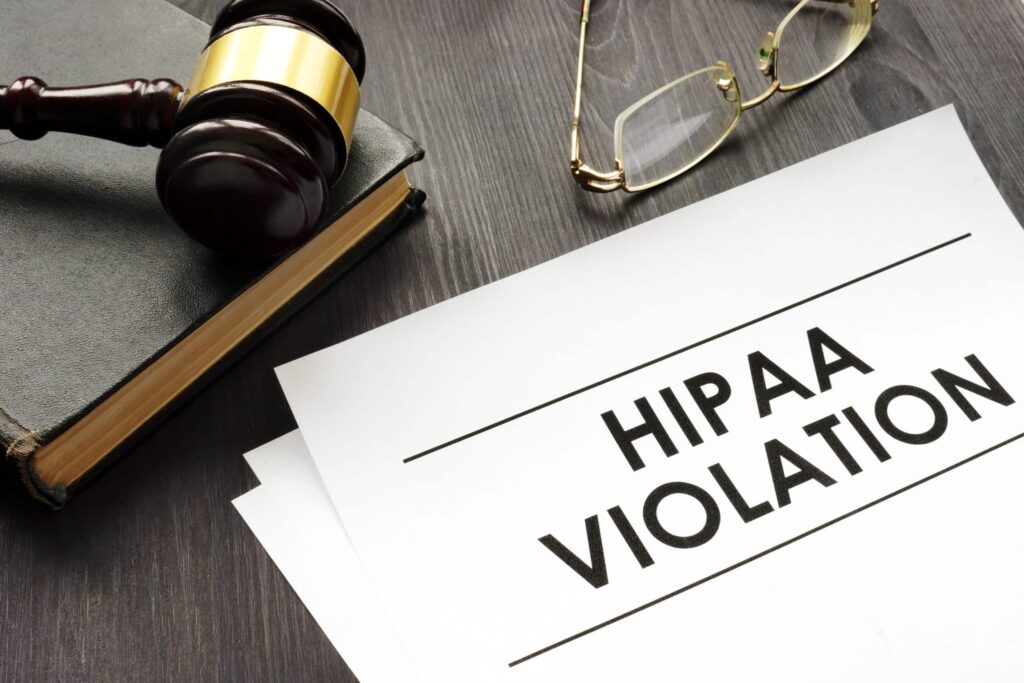When it comes to healthcare administration, protecting patient privacy is imperative.
Today, confidential patient information and handling such records is a codified practice enforced by the Health Insurance Portability and Accountability Act (HIPAA)—a legal act explicitly requiring covered entities to safeguard patients’ sensitive healthcare data.
While the legal statutes behind these regulations are extensive, they aren’t always followed to the letter. As a result, HIPAA violations—breaches of the act itself—occur more often than you think and often come with harsh penalties. But, perhaps, more importantly, protecting private information while giving patients access to their health records increases patient trust.
In this blog, we’re going to break down the most common HIPAA violations and, more importantly, how you can keep your organization HIPAA compliant.
1. Nosy employees peeking at private records
In 2011, a doctor at UCLA Medical Center earned the healthcare organization a whopping $865K HIPAA fine for failing to protect celebrity medical records. Unfortunately, this is a common example of employees taking advantage of their access to patient records out of simple curiosity or for personal gain.
Regardless of the motivation, when an employee accesses sensitive patient information without proper authorization, it’s a clear HIPAA violation and can lead to punitive fines, criminal penalties and significant reputational damage.
How to avoid this HIPAA violation:
To improve the privacy and security of patient records in healthcare offices, it’s essential to establish a culture that values and enforces HIPAA regulations. In addition, any suspected patient privacy violations must be promptly addressed. It’s also important to prioritize hiring individuals with high professional integrity. To help, all RingRx staff are certified and receive continuing education and training to guide clients on HIPAA regulations and compliance.
2. Failing to audit and regularly verify HIPAA compliance
As wide-reaching as HIPAA is, it is largely self-enforced. Regulatory agencies may oversee and conduct checks for compliance, but the covered entity’s responsibility is to remain compliant as the regulations evolve.
A common HIPAA violation is simply failing to audit and verify your ongoing compliance. While many healthcare institutions and providers have departments dedicated to remaining compliant, smaller operations can be out of step.
How to avoid this HIPAA violation:
Set up a HIPAA-compliant system. This means conducting a detailed review of the latest HIPAA regulations, cross-checking internal practices for security vulnerabilities, and implementing a comprehensive plan to address gaps. You could also partner with a third-party expert, such as Compliancy Group, and ensure your vendors manage annual external network systems and data custody audits, including deployment and maintenance practices.
3. Failing to act on violations discovered
If you discover an aspect of your organization that is in breach of HIPAA compliance and you fail to address it within a timely manner, you are in violation.
The longer you’re “in breach” of HIPAA compliance, the harsher the final penalties. So, if you discover that you’re out of step with the latest HIPAA regulation, the best practice is to fix it fast, or it may be more costly with time.
How to avoid this HIPAA violation:
Once a violation is identified, get to correcting it immediately. So, whether it’s ensuring your organization adopts HIPAA-compliant phones to prevent data leaks or to transition to compliant VoIP services, identify the problem and implement a solution—quickly.
4. Failing to report a breach
Finding and acting on an identified violation doesn’t mean you’re in the clear. There’s one final step—you must report the breach. Even in the self-regulating environment of identifying and addressing your HIPAA violations, you must communicate breaches to the HHS within 60 days.
In short, if you commit an infraction, you will be expected to identify, fix, and take responsibility for it. This may seem simple, but reporting can easily be forgotten depending on the violation.
How to avoid this HIPAA violation:
Commit to the three-part procedure of identifying, addressing, and reporting. The final step of reporting will become second nature by committing to maintaining HIPAA compliance.
5. Missing the deadline to give patients their records
Some HIPAA violations simply arise due to negligence or dysfunction. Failing to provide patient records on time is a chief example of this.
According to HIPAA regulation, if a patient asks for their records, the healthcare entity must provide them within 30 days of the request. That’s it. Any delivery of the patient records after that date violates HIPAA and is punishable by potential fines and other penalties.
How to avoid this HIPAA violation:
Strengthen your patient record system to streamline patient record distribution. That may be easier said than done for some healthcare entities but if back-of-the-house issues in healthcare administration are the problem, addressing them is the only solution.
6. Losing secure devices
A common HIPAA violation is putting patient information in the hands of unauthorized users purely as a result of device loss or theft. For example, a disgruntled former employee that misuses patient data or steals a data-sensitive device can lead to HIPAA violations.
Although this is unpredictable, there are steps that an organization can take to mitigate exposure and loss.
How to avoid this HIPAA violation:
Improve your procedures surrounding employee resignations, terminations, and on-site security. While the former will explicitly address equipment access and permissions, the latter should address burglary or equipment destruction on-site.
7. Mishandling files through a lack of disposal or encryption
One of the most common HIPAA violations is simply mishandling files—failing to dispose of files or by a lack of encryption. For example, if patient records are designated to be deleted or destroyed (digitally or physically) and a healthcare entity fails to eradicate them, that is a HIPAA violation.
On the other hand, patient information accessed through software—such as on a laptop or phone—that doesn’t have the required level of encryption capability is also in violation of HIPAA.
The purpose of HIPAA is to ensure the privacy and protection of confidential patient records. By failing to dispose of or responsibly safeguard these records, you will invariably open the door to harsh regulatory fines and punishments for your organization.
How to avoid this HIPAA violation:
When it comes to HIPAA compliance, it’s all about procedure. By setting clear and HIPAA-compliant standards relating to record disposal and encryption requirements, you’ll remain a step ahead of falling short every time. You should also partner with vendors using technology to ensure data is encrypted to enhanced security standards and prevent breaches and unauthorized access.
Closing thoughts
HIPAA violations may be common but can be easily prevented. RingRx offers a secure cloud-based platform for healthcare organizations. As a result, it is possible to stay compliant with HIPAA regulations and keep your organization in line with the latest regulatory changes.
If you’re interested in a free trial of a more helpful HIPAA-compliant phone system, contact info@ringrx.com or call 1-888-9860 to get started.




